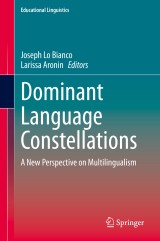Details

Dominant Language Constellations
A New Perspective on MultilingualismEducational Linguistics, Band 47
|
96,29 € |
|
| Verlag: | Springer |
| Format: | |
| Veröffentl.: | 07.09.2020 |
| ISBN/EAN: | 9783030523367 |
| Sprache: | englisch |
Dieses eBook enthält ein Wasserzeichen.
Beschreibungen
<p>This volume is dedicated to the concept and several applications of Dominant Language Constellations (DLC), by which it advances understanding of current multilingualism through addition of a novel perspective from which to view contemporary language use and acquisition. The term Dominant Language Constellation denotes the set of a person’s or group's most expedient languages, functioning as an entire unit and enabling an individual or group to meet their needs in a multilingual environment. The volume presents pioneering contributions that employ DLC as the lens for analysing a wide array of issues. These include multilingual syntactic development, cross-linguistic interaction and multilingual production in formal and informal educational contexts, as well as linguistic profiles of multilingual groups used in elementary school and higher education. Other DLC issues include discussions of how identity, emotions and attitudes operate in various minority and majority contexts. Becausethe DLC concept does not assume any inherent hierarchy of languages it can serve as a framework public policy in multilingual countries/communities faced with challenging policy determinations regarding choice of languages for use in education settings and more widely in social institutions and the economy. Some chapters develop and extend the DLC concept, others adapt and apply it to a variety of contexts, both global and local. Many chapters feature educational and social settings across large parts of the world– Africa, Australia, Europe, North America (Canada and the USA) and Southeast Asia. The volume can serve as supplementary reading for courses on multilingualism, sociolinguistics, language policy and planning, educational linguistics, Second and Third Language Acquisition. </p><br><p></p>
<p><b>Foreword</b> <i>Li Wei.-</i><b><i>Introduction.- Chapter 1: The DLC: Concepts and Practical Applications: </i></b><i>Joseph Lo Bianco and Larissa Aronin.- </i><b>Part 1 Current Developments of DLC.- Chapter 2. </b>Dominant Language Constellation as an approach for studying multilingual practices: <i>Larissa Aronin </i>(Israel).- <b>Chapter 3. </b>A Meeting of Concepts and Praxis: Multilingualism, Language Policy and the Dominant Language Constellation <i>Joseph Lo Bianco (Australia).- </i><b>Chapter 4. </b>Where DLC meets multilingual syntactic development<i> Eva Fernández-Berkeś and Suzanne Flynn </i>(The USA and Austria).- <b>Chapter 5.</b> Shifting Multi-Layered Dominant Language Constellations in Dynamic Multilingual Contexts: African Perspectives Felix Banda<b> </b>(South Africa).- <b>Part 2 Institutional expressions of DLC.- Chapter 6. </b>Societal Versus Individual Patterns of DLCs in a Finnish Educational Context - Present State and Challenges for the Future <i>Mikaela Björklund, Siv Björklund, and Kaj Sjöholm (Finland).- </i><b>Chapter 7. </b>Language Background Profiling at Canadian Elementary Schools and Dominant Language Constellations <i>Nikolay Slavkov </i>(Canada).- <b>Chapter 8. </b>Dominant language constellations in the language repertoires of multilingual South African students<b> </b><i>Susan Coetzee Van Rooy</i><b> </b>(South Africa).- <b>Part 3 Personal and group experiences with DLC.- Chapter 9. </b>The Evolution of personal Dominant Language Constellation<b> </b><i>Sarasi Kannangara</i><b> </b>(Germany).- <b>Chapter 10. </b>Dominant Language Constellations of Russian Speakers in Cyprus <i>Sviatlana Karpava </i>(Cyprus).- <b>Chapter 11. </b>Studying crosslinguistic interaction in multilingual production through the Dominant Language Constellation<i> Stela Letica Krevelj</i> (Croatia).- <b>Chapter 12. </b>A Dominant Language Constellations case study on language use and the affective domain <i>Richard Mark Nightingale (</i>Spain).- <b>Conclusion – Chapter 13 </b>Quo Vadis, DLC? <i>Joseph Lo Bianco.</i><b> Name index.- Subject index.</b></p>
<p> </p><br><p></p>
<p> </p><br><p></p>
<div>This volume is dedicated to the concept and several applications of Dominant Language Constellations (DLC), by which it advances understanding of current multilingualism through addition of a novel perspective from which to view contemporary language use and acquisition. The term Dominant Language Constellation denotes the set of a person’s or group's most expedient languages, functioning as an entire unit and enabling an individual or group to meet their needs in a multilingual environment. The volume presents pioneering contributions that employ DLC as the lens for analysing a wide array of issues. These include multilingual syntactic development, cross-linguistic interaction and multilingual production in formal and informal educational contexts, as well as linguistic profiles of multilingual groups used in elementary school and higher education. Other DLC issues include discussions of how identity, emotions and attitudes operate in various minority and majority contexts. Because the DLC concept does not assume any inherent hierarchy of languages it can serve as a framework public policy in multilingual countries/communities faced with challenging policy determinations regarding choice of languages for use in education settings and more widely in social institutions and the economy. Some chapters develop and extend the DLC concept, others adapt and apply it to a variety of contexts, both global and local. Many chapters feature educational and social settings across large parts of the world– Africa, Australia, Europe, North America (Canada and the USA) and Southeast Asia. The volume can serve as supplementary reading for courses on multilingualism, sociolinguistics, language policy and planning, educational linguistics, Second and Third Language Acquisition. <br></div><div><br></div>
Introduces the concept of Dominant Language Constellations Offers an additional and novel perspective on the use of languages in a multilingual world Suggests ways of dealing with real-life multilingual situations across the world in educational and social contexts Links Dominant Language Constellations to timely issues in multilingualism, sociolinguistics, sociology of language and applied linguistics

















